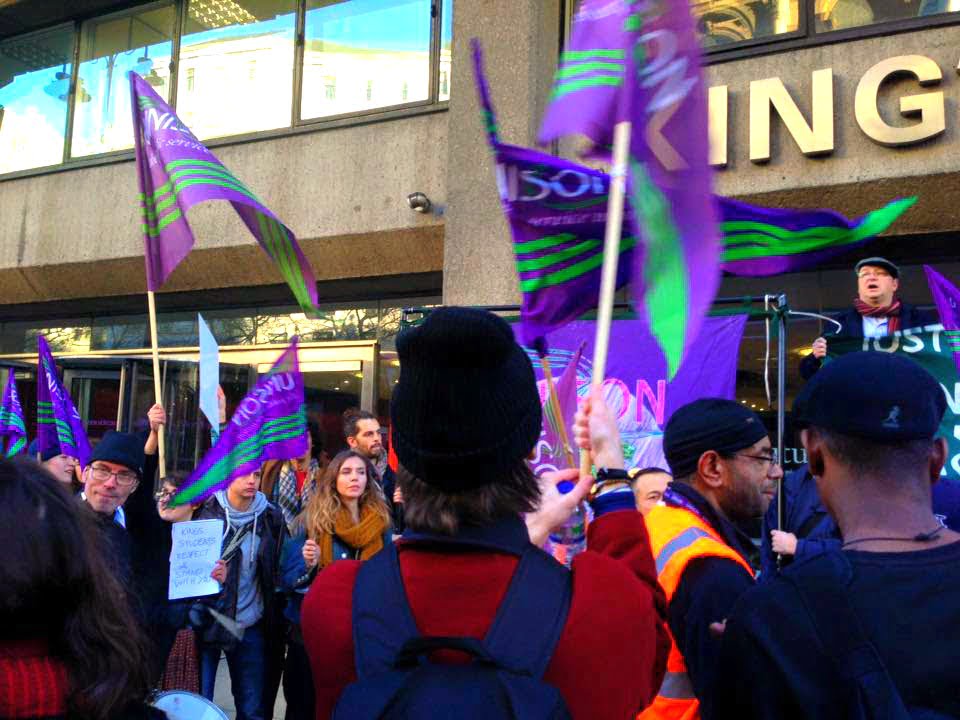To cut costs and maximise profits, King’s College London outsources its cleaning services, with workers who are on precarious contracts, earning just over the minimum wage, and with limited sick pay and holiday time. But the KCL cleaners are fighting back. Joe Russell reports on the continuing struggle of cleaners at KCL for decent pay and conditions.
On Friday 24 November, the cleaners of King’s College London, alongside 40 sympathisers and supporters, met to discuss the next steps in their struggle to be brought back in house and achieve better working conditions.
Like many other universities, King’s has contracted out its cleaning services. The cleaners are therefore technically not employed by the university, but a parasitic outsourcing company called Servest, and so have significantly worse terms and conditions relative to their in-house colleagues.
To cut costs and maximise profits, the cleaners are on precarious contracts, earning just over the minimum wage and with limited sick pay and holiday time. Their employers even fail to provide suitable equipment. Cleaners stated they have had to use fizzy drink bottles to hold harmful and corrosive chemical cleaning products!
The demands of the unionised cleaners are simple: for their contracts to be brought back in house by the university; for the London living wage; and for parity of sick pay, holidays and maternity leave.
King’s has been in talks with union reps from Unison, who are leading negotiations. But the struggle has been on going for years and the University has still not failed to improve the conditions of their cleaning staff, despite the ‘mission statement’ on their website:
“King’s will be the university that makes a significant and innovative contribution by serving the needs and aspirations of society and the wider world.”
They could start by employing and properly paying the people who clean their campuses!
Workers and students: unite and fight!
Many students attended the meeting, but the discussions were all led by the cleaners themselves.
There were some disagreements about a planned demonstration on Friday. Some worried that demonstrations could upset negotiations, which have seen the university give assurances it would provide the living wage (but no mention of bringing anyone in house).
Despite their appallingly difficult circumstances, most of the cleaners took a militant and courageous position, arguing that the university will never give them what they deserve without the pressure of action ‒ up to and including strikes. This would of course require the solidarity of the student body and academics.
Following impassioned speeches from unionists, and victorious cleaners from successful campaigns in LSE and SOAS, the more militant position seemed to come out on top. The meeting concluded with plans for the demonstration to go ahead, but it was hinted at by Unison reps that it may be called off depending on the university’s proposals in negotiations.
Students broke off into focus groups to develop strategies for building awareness, agitation and solidarity among other students, in order to be able to campaign alongside the cleaners should industrial action be taken. This could be vital to reassure those cleaners who are justifiably concerned about losing their jobs for daring to stand up for themselves.
The KCL Marxist Society, which has already passed a motion of solidarity with the campaign, will be hosting a joint meeting with Justice for Cleaners on Friday evening to discuss the broader political questions around outsourcing, casualisation and the gig economy.
The student union (that is formally committed to support the cleaners) should be taking a leading role in mobilising King’s students, while the academics’ union UCU should declare its solidarity with its colleagues.
Beyond that, Unison should politicise the campaign by joining up with branches in other London universities and by lobbying other unions and the Labour Party to build for a widespread industrial action to fight the scourge of casualisation and worker exploitation.






